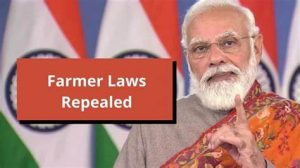
Staff Writer
The government of Narendra Modi on Friday was forced to announce the halt to possible new laws governing farming in the country. The three laws in question would see the price, sale and storage of seeds and product be placed under market forces, threating over half of the country’s farmers, who were previously guaranteed so-called minimum sale prices by the government. In addition, the new law would have seen farmer cooperatives and conglomerates allowed to store seed and product, which currently falls only under the remit of the government. Thousands of farmers had been protesting in the capital for a year, with most arguing that they would only stop once the process was formally repealed.
The loss is a serious blow to the Modi government, especially in relation to his so-called perception of invincibility, and was praised by opposition politicians, including Rahul Ghani. It is noteworthy that most concur that this measure was a result of upcoming state elections, especially in Punjab and Uttar Pradesh, which have large farmer contingents. Delhi wants to get these back on side, especially in Uttar Pradesh, which will likely see it lose around 40-60 seats. It is, however, doubtful if this will work, especially as the country is suffering economically, with higher-than-expected unemployment and inflation, and because of the violent nature of how the protests were dealt with by Delhi.
Speaking to Radio Islam International, Suparna Sharma, resident editor of the Asian Age Daily, argued that this was a big victory for farmers, and noted that over 600 million would have been impacted by these new laws. She further noted the lengths the government went to in trying to deal with the protests, highlighting its failures. Sharma said, “They’ve tried to malign the farmers, they’ve called the farmers terrorists, slapped cases of sedition. They would suddenly on some nights arrive with huge trucks and try and intimidate the farmers. They [even] laid nails on the ground.. They did everything to stop this movement from becoming bigger.” Sharma also noted that Modi did not attend a single meeting with the farmers.
Sharma said that this provides a lesson and a blue print for farmers and minorities – that because India’s institutions are increasingly compromised, peaceful protest are the only way of being heard. She said, “India is increasingly becoming a country, though we are a democracy, but increasingly a country where every institution is compromised from media legislature, bureaucracy, judiciary, etc. So, the lesson for people, especially minorities for Muslims, Christians, even the farmers, is that peaceful protest is the only way to get heard.”
She also cautioned politicians about implementing policies, which would directly hinder the livelihoods of people, noting that these were likely to be met with protest, especially in a more democratic society.







0 Comments